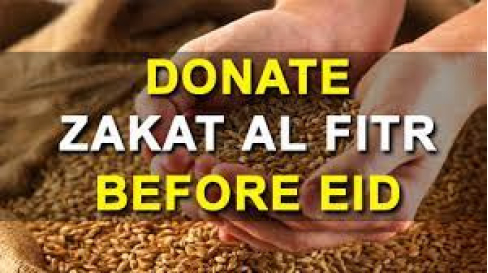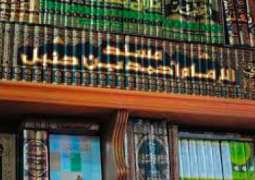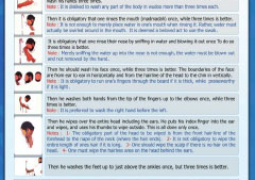
Zakat ul-fitr is a type of sadaqah which must be paid by every Muslim, young and old, male and female, free and slave, at the end of the month of fasting (Ramadan). Al-Bukhari and Muslim relate from Ibn ‘Umar that he said: “The Prophet, upon whom be peace, enjoined the payment of one Sa’ of dates or one Sa’ of barley as zakat ul-fitr on every Muslim, young and old, male and female, free and slave.”
The Purpose of Zakat ul-Fitr
Zakat ul-fitr was made obligatory in the month of Sha’ban in the second year of the hijrah. Its purpose is to purify one who fasts from any indecent act or speech and to help the poor and needy. This view is based upon the hadith reported by Abu Dawud, Ibn Majah, and ad-Daraqutni from Ibn ‘Abbas. The Messenger of Allah, upon whom be peace, enjoined Zakat ul-Fitr on the one who fasts to shield one’s self from any indecent act or speech and for the purpose of providing food for the needy. It is accepted as zakah for the person who pays it before the ‘id salah, and it is sadaqah for the one who pays it after the salah.
Who Must Pay Zakat ul-Fitr
Zakat ul-fitr is incumbent on every free Muslim who possesses one Sa’ of dates or barley which is not needed as a basic food for himself or his family for the duration of one day and night. Every free Muslim must pay zakat ul-fitr for himself, his wife, children, and servants.
The Amount of Zakat ul-Fitr
The required amount of zakat ul-fitr is one sa’ of wheat, barley, raisins, dry cottage cheese (aqit), rice, corn, or similar items considered as basic foods (qut). Abu Hanifah made it permissible to set aside, as a Zakat ul-fitr, an equivalent value and also said that if the payer pays in wheat, one-half of a Sa’ would be sufficient. Abu Sa’id al-Khudri reported: “We used to give on behalf of every child, old person, freeman, and slave during the lifetime of the Messenger of Allah, upon whom be peace, one Sa’ of food, or one Sa’ of dried cottage cheese, or one sa’ of barley, or one sa’ of dates, or one Sa’ of raisins as zakat ul-fitr. We continued to do so until Mu’awiyyah came to us to perform pilgrimage (hajj) or a minor pilgrimage (‘Umrah). He then addressed the people from the pulpit and said to them: ‘I see that two mudds of wheat of Syria equals one Sa’ of dates.’ The people accepted that.” However, Abu Sa’id contended: “I would continue to give as I used to give, namely, one sa’ as long as I live.” This is related by most hadith narrators. At-Tirmizhi remarks: “Some of the scholars gave one Sa’ from every charitable item [which is accepted as a sound practice].” Ash-Shaf’I and Ishaq sustain this view but some other scholars gave one Sa’ from every charitable item except wheat, of which only half a sa’ would be sufficient. This is the saying of Sufyan, Ibn al-Mubarak, and the scholars of Kufah.
When Zakat ul-Fitr is Due
The jurists agree that zakat ul-fitr is due at the end of Ramadan. They differ, however, about the exact time.
Ath-Thauri, Ahmad, Ishaq, and ash-Shaf’i (in his later opinion), and Malik (in one of his reports) are of the opinion that it is due at the sunset of the night of breaking the fast, for this is when the fast of Ramadan ends. Abu Hanifah, al-Layth, ash-Shaf’i (in his original opinion), and the second report of Malik say that zakat ul fitr is due at the start of fajr on the day of ‘id.
These two different views acquire relevance if a baby is born after sunset but before dawn on the day of ‘id; the question then is whether zakat ul-fitr is obligatory for the baby or not. In accordance with the first view, it is not since the birth took place after the prescribed time, while according to the second view, it is due because the birth took place within the prescribed space of time.
Paying Zakat ul-Fitr in Advance
Most scholars believe that it is permissible to pay zakat ul-fitr a day or two before ‘id. Ibn ‘Umar reports that the Messenger, upon whom be peace, ordered them to pay zakat ul-fitr before the people went out to perform the ‘id prayers. Nafi’ reports that ‘Umar used to pay it a day or two before the end of Ramadan. However, scholars hold different opinions when a longer time period is involved. According to Abu Hanifah, it is permissible to pay it even before Ramadan. Ash-Shaf’i holds that it is permissible to do so at the beginning of Ramadan. Malik and Ahmad (in his well-known view) maintain that it is permissible to pay it only one or two days in advance.
The founders of the four accepted Islamic legal schools agree that zakat ul-fitr is not nullified simply by not paying it on its due date. If such is the case, it becomes a debt on the one responsible for it until it is paid. They also agree that it is not permissible to delay it until the day of ‘id, but Ibn Sirin and Nakha’i say that this can be done. Ahmad says: “I hope that there is no harm [in the delay of its payment].” Ibn Raslan says that there is a consensus that its payment cannot be delayed just because it is a type of zakah. Thus, any delay is a sin and is analogous to delaying one’s prayers without an acceptable excuse. This is proved by the following hadith: “If one pays zakat ul-fitr before the salah, it is considered an accepted zakah. If he pays it after the salah, it is considered an ordinary sadaqah.”
Distribution of Zakat ul-Fitr
The distribution of zakat ul-fitr is the same as that of zakah-- that is, it has to be distributed to the eight groups of beneficiaries mentioned in the ‘ayah: “The alms are only for the poor ...” [at-Taubah 60]. The category comprising the poor is considered the most deserving. This is also supported by the hadith: “The Messenger of Allah, upon whom be peace, enjoined zakat ul-fitr as a purification for the one who fasts from any indecent act or speech, and as food for the needy.”
EID AL- FITR
Eid al-Fitr “festival of breaking of the fast”) is an important religious holiday celebrated by Muslims worldwide that marks the end of Ramadan, the Islamic holy month of fasting (sawm). The religious Eid is the first and only day in the month of Shawwal during which Muslims are not permitted to fast. The holiday celebrates the conclusion of the 29 or 30 days of dawn-to-sunset fasting during the entire month of Ramadan. Eid al-Fitr is observed when the first new moon is sighted.
This can lead to the festival being celebrated on different days in different parts of the world.
While some Muslims wait to be able to see the moon themselves, many either use the calculated time of the new moon, or base it on the declaration made in Saudi Arabia.
How is Eid al-Fitr celebrated?
On the day of Eid, Muslims gather at mosques in the morning to perform the Eid prayer, before holding family gatherings and visiting friends.
Muslims share feasts and sweets to mark the end of the fasting period, and greet each other by saying “Eid Mubarak” - which roughly translates as “happy Eid” or “blessed Eid.”
The celebrations last for three days, and are seen as a time of forgiveness and of giving thanks to Allah for helping people to complete their spiritual fasting.
Many Muslims display this thanksgiving by giving donations and food to those less fortunate than themselves.
Many Muslims attend communal prayers and listen to a khutba or sermon on the first day of the month of Shawwal. These prayers are held outside or in large venues, such as sports arenas, in some places. Many Muslims may travel far to participate in these activities. Some communities organize different festivities, such as communal meals or events for children, on this day.
If a Muslim has not given zakat al-fitr during Ramadan, he or she can give this on Eid-al-Fitr. Zakat al-fitr is a form of charity consisting of a quantity of food, such as barley, dates, raisins or wheat flour, or its monetary equivalent given to the poor. Many Muslims may also prepare festive meals to share, wear new clothes, visit relatives and give presents or candy to children. Cards can also be sent, often featuring the words “Eid Mubarak” (Blessed Eid) In advance.



